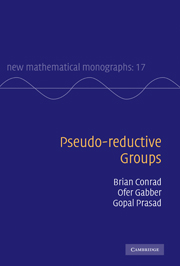Book contents
- Frontmatter
- Contents
- Introduction
- Terminology, conventions, and notation
- Part I Constructions, examples, and structure theory
- Part II Standard presentations and their applications
- Part III General classification and applications
- 7 The exotic constructions
- 8 Preparations for classification in characteristics 2 and 3
- 9 The absolutely pseudo-simple groups in characteristic 2
- 10 General case
- 11 Applications
- Part IV Appendices
- References
- Index
11 - Applications
from Part III - General classification and applications
Published online by Cambridge University Press: 05 July 2011
- Frontmatter
- Contents
- Introduction
- Terminology, conventions, and notation
- Part I Constructions, examples, and structure theory
- Part II Standard presentations and their applications
- Part III General classification and applications
- 7 The exotic constructions
- 8 Preparations for classification in characteristics 2 and 3
- 9 The absolutely pseudo-simple groups in characteristic 2
- 10 General case
- 11 Applications
- Part IV Appendices
- References
- Index
Summary
This chapter gives some applications of Theorem 5.1.1 over general fields. The reader is referred to [Con2] for arithmetic applications of Theorem 5.1.1 (and Proposition 7.3.3) to general finiteness theorems for all affine group schemes of finite type over global function fields (over finite fields).
Maximal tori in pseudo-reductive groups
Our concrete description of pseudo-reductive groups enables us to analyze the structure of such groups by means of maximal tori, as well as to analyze problems related to the structure of maximal tori. We begin with a toric criterion for a pseudo-reductive group to be reductive (away from characteristic 2).
Theorem 11.1.1Let k be a field with char(k) ≠ 2. A pseudo-reductive k-group G is reductive if and only if some (equivalently, every) Cartan k-subgroup is a torus.
We do not know a direct proof of Theorem 11.1.1 using Tits' structure theory for pseudo-reductive groups as in §§2.1-3.5. An interesting application of this result is given in Theorem C.1.9 (which is never used elsewhere in this monograph).
Proof. It is a well-known fact that maximal tori in connected reductive groups over any field are their own centralizers [Bo2, 13.17, Cor. 2(c)], which is to say that Cartan subgroups are tori in such groups. For the converse, we will use that char(k) ≠ 2.
Let T be a maximal k-torus of G and C = ZG(T) the associated Cartan subgroup.
- Type
- Chapter
- Information
- Pseudo-reductive Groups , pp. 358 - 388Publisher: Cambridge University PressPrint publication year: 2010



